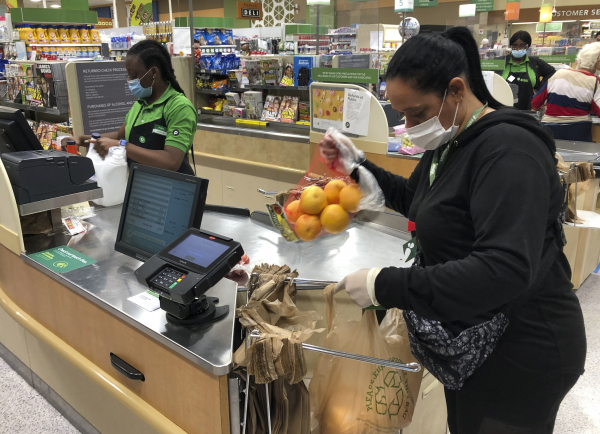Instacart, Organized Labor, and the Gig Economy

Yelitza Esteva, right, bags groceries for an order Wednesday, April 15, 2020, in Surfside, Fla. Esteva was a hairstylist. She now makes supermarket deliveries. Esteva and her husband work for the grocery delivery service Instacart and make an average of $150 per day, working more than 12 hours daily. AP Photo/Wilfredo Lee
Since the pandemic began, a lot of people have been avoiding crowds by relying on delivery services for takeout and groceries. One of the most popular grocery delivery services is a multi-billion dollar company called Instacart. Before the COVID-19 pandemic hit last year, a group of Instacart employees in Skokie, Illinois voted to unionize with the United Food and Commercial Workers Local 1546. That chapter of the UFCW represents around 25,000 workers in Illinois and Northwest Indiana, across a variety of industries — including grocery stores and pharmacies.
The employees in Skokie made history by becoming the first Instacart workers to win a certified union election in the U.S. But as they were negotiating their first contract, Instacart announced a series of layoffs affecting nearly 2,000 of its in-store shoppers, including the 10 who had voted to unionize.
The 21st sat down with one of the workers who voted to unionize and got fired to hear more.
Then, that occurence is sparking a nationwide conversation about protections for gig economy workers — Uber and Lyft drivers, grocery and restaurant delivery workers, and the people who watch our pets — often hired through the click of an app. Workers say these contract positions can provide flexible hours and scheduling, but lack some of the employment protections and benefits that come with permanent jobs, especially during a pandemic.
The 21st spoke to the Special Assistant to the President of United Food Commercial Workers Union and a lecturer at the Labor Education Program at the University of Illinois at Urbana-Champaign to hear more.
Guest:
Noell Marion, Instacart in-store shopper at Mariano’s in Skokie, Illinois (1 of the 10 workers that voted to unionize that got fired)
Jeff Weiss, Special Assistant to the President of UFCW (United Food and Commercial Workers Union) Local 1546 in Chicago
Stephanie Furtado, Lecturer at the Labor Education Program at the University of Illinois at Urbana-Champaign
Prepared for web by Zainab Qureshi
Help shape our coverage on The 21st by joining our texting group and answering weekly questions. To join, text “TALK” to 217-803-0730 or sign up with your phone number below:

